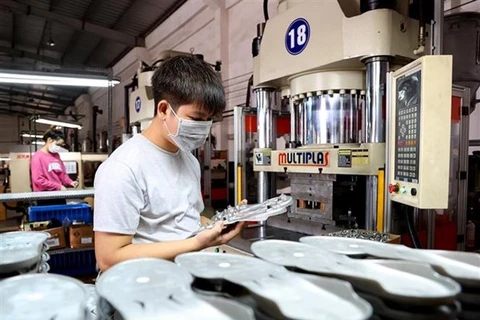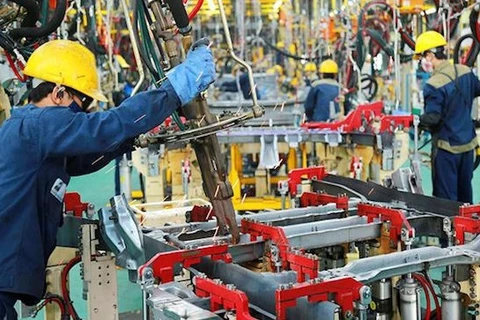Hanoi (VNA) - Vietnam’s maintaining the momentum of public investment will be crucial because it will rejuvenate economic activities, generate employment, and enhance domestic consumption, said ADB Country Director for Vietnam Shantanu Chakraborty.
The bank's September report forecast that Vietnam's economic recovery would pick up in the near term on the back of strong domestic consumption, moderate inflation, acceleration of public investment, and improved trade activities.
The ADB remains very confident that Vietnam will be able to achieve an overall annual growth of 5.8% for 2023, Chakraborty said in an interview with the Vietnam News Agency about the economic outlook and the premises for the projections.
“This is premised upon early signs of upticks in the services industry and in the construction industry. We are also seeing growth in the agricultural sector, given the robust stability that has been shown in agricultural prices. So, there are some drivers of the economy that we believe will contribute towards Vietnam achieving its 5.8% economic growth, despite sluggish growth in the first couple of quarters.”
“I believe maintaining the momentum of public investment will be crucial because that is what is going to rejuvenate economic activities, generate employment, and put more money in the hands of people to enhance domestic consumption.”
He went on noting that the monetary and fiscal policies adopted by the government up until now have really facilitated keeping inflation under control.
The ADB’s current projection of inflation in Vietnam is 3.8% for 2023, and 4% for 2024, he unveiled, stressing certain challenges in terms of the global increasing interest rates, the disruptions caused by certain geopolitical events, and the monetary tightening in some countries.
“But overall, given the stability of agricultural production in the country so far, and the fact that oil and gas prices are expected to remain stable for the rest of the year, I strongly believe that, based on the low inflation rates that were experienced by Vietnam in the first half of the year, overall inflation of 3.8% is very much achievable.”
Regarding the key growth drivers of the economy in 2024, the Country Director put public investment as number one. By some estimates, there is about 30 billion USD of public investment that has been planned, so a concerted effort needs to be made to expedite spending the money. That will really boost demand in the market, lead to employment generation, and foster overall economic activities.
Underscoring the importance of consumption, he said given that inflation is now low and there is liquidity in the hands of people, domestic consumption needs to remain strong to offset the adverse impact of export-related activities.
Concerning high interest rates in Vietnam's key trading partners that have depressed the demand for Vietnamese exports, he suggested the country continue to look for new niches where it can provide more value-added services, and try to diversify its export commodity base to more sectors so it can maintain its competitive edge in the international market. More importantly, Vietnam should improve its competitiveness by streamlining its cost structure. And for that, the government plays a big role in terms of ensuring certainty for export-oriented private sector investors to come to the nation and have access to a stable enabling environment and strong infrastructure.
“Those are some of the steps that Vietnam can take to diversify this product base and move up the value chain to actually offer more value-added services to the international market, alleviating the challenges that will be faced by the export sector.”
Pointing to current public debt to GDP of about 38% and the stipulated target that the government has set for itself within a 60% range, Chakraborty noted there is a significant amount of fiscal headroom that the government can deploy, by borrowing more and spending on public investment.
“I see this as a strong opportunity to really push the agenda to spending on infrastructure and the social sector, including providing benefits for unemployment and initiating VAT cuts. I would suggest the government expedite the rollout of VAT cuts, and also extend their tenor to the end of 2024 to reinvigorate domestic consumption.”/.
The bank's September report forecast that Vietnam's economic recovery would pick up in the near term on the back of strong domestic consumption, moderate inflation, acceleration of public investment, and improved trade activities.
The ADB remains very confident that Vietnam will be able to achieve an overall annual growth of 5.8% for 2023, Chakraborty said in an interview with the Vietnam News Agency about the economic outlook and the premises for the projections.
“This is premised upon early signs of upticks in the services industry and in the construction industry. We are also seeing growth in the agricultural sector, given the robust stability that has been shown in agricultural prices. So, there are some drivers of the economy that we believe will contribute towards Vietnam achieving its 5.8% economic growth, despite sluggish growth in the first couple of quarters.”
“I believe maintaining the momentum of public investment will be crucial because that is what is going to rejuvenate economic activities, generate employment, and put more money in the hands of people to enhance domestic consumption.”
He went on noting that the monetary and fiscal policies adopted by the government up until now have really facilitated keeping inflation under control.
The ADB’s current projection of inflation in Vietnam is 3.8% for 2023, and 4% for 2024, he unveiled, stressing certain challenges in terms of the global increasing interest rates, the disruptions caused by certain geopolitical events, and the monetary tightening in some countries.
“But overall, given the stability of agricultural production in the country so far, and the fact that oil and gas prices are expected to remain stable for the rest of the year, I strongly believe that, based on the low inflation rates that were experienced by Vietnam in the first half of the year, overall inflation of 3.8% is very much achievable.”
Regarding the key growth drivers of the economy in 2024, the Country Director put public investment as number one. By some estimates, there is about 30 billion USD of public investment that has been planned, so a concerted effort needs to be made to expedite spending the money. That will really boost demand in the market, lead to employment generation, and foster overall economic activities.
Underscoring the importance of consumption, he said given that inflation is now low and there is liquidity in the hands of people, domestic consumption needs to remain strong to offset the adverse impact of export-related activities.
Concerning high interest rates in Vietnam's key trading partners that have depressed the demand for Vietnamese exports, he suggested the country continue to look for new niches where it can provide more value-added services, and try to diversify its export commodity base to more sectors so it can maintain its competitive edge in the international market. More importantly, Vietnam should improve its competitiveness by streamlining its cost structure. And for that, the government plays a big role in terms of ensuring certainty for export-oriented private sector investors to come to the nation and have access to a stable enabling environment and strong infrastructure.
“Those are some of the steps that Vietnam can take to diversify this product base and move up the value chain to actually offer more value-added services to the international market, alleviating the challenges that will be faced by the export sector.”
Pointing to current public debt to GDP of about 38% and the stipulated target that the government has set for itself within a 60% range, Chakraborty noted there is a significant amount of fiscal headroom that the government can deploy, by borrowing more and spending on public investment.
“I see this as a strong opportunity to really push the agenda to spending on infrastructure and the social sector, including providing benefits for unemployment and initiating VAT cuts. I would suggest the government expedite the rollout of VAT cuts, and also extend their tenor to the end of 2024 to reinvigorate domestic consumption.”/.
VNA


























